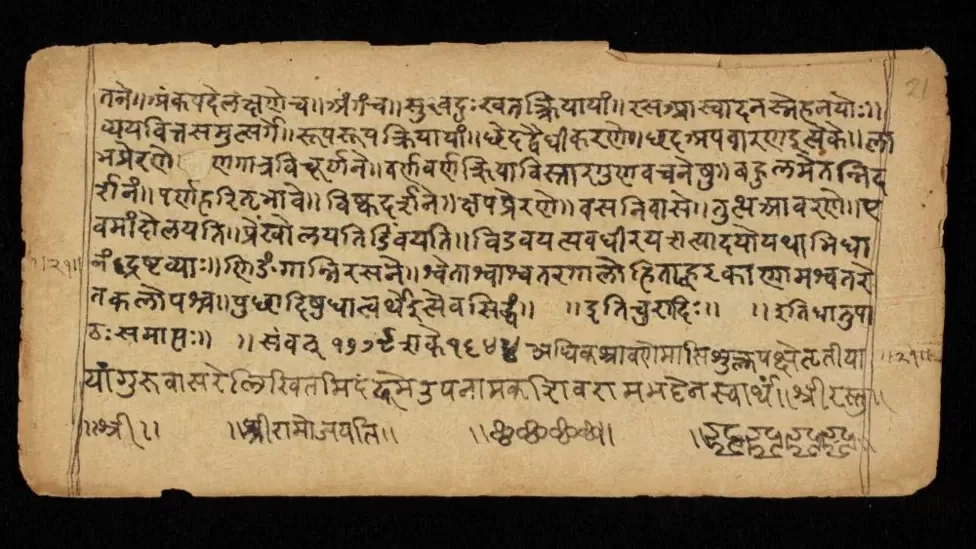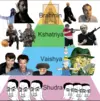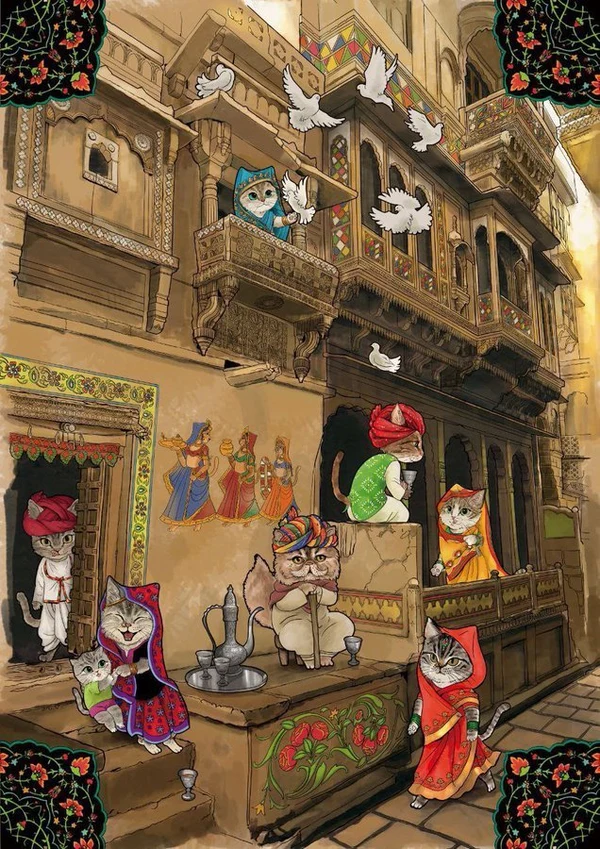- 7
- 5
Now that World Cup is over can we take a moment to thank mota bhai for providing millions of Indians free World Cup streaming on jio cinema without any interruptions from ads .
— Sagar Bandodkar 🇮🇳💹 (@sagarbandodkar2) December 18, 2022
This doesn't have any ads every 45 seconds like my match fixing premier league

Like how do you watch a full game and even think ads in the middle are realistic?  Fricking maraturds man. The ones I see irl make bimarus look like geniuses.
Fricking maraturds man. The ones I see irl make bimarus look like geniuses.
- 10
- 5
asking a telugu guy for gaalis in 'malayalam' to trigger chennai guy 
Why are northies like this?! @CantBanMe
@Sasanka_of_Gauda pls give explanashun immediately
https://old.reddit.com/r/hyderabad/comments/zppf9b/what_i_have_to_go_through_on_a_daily_basis_as_a/
- 11
- 11
when are you expected to pull out answers within seconds anyways. this is just test prep crap
Tests aren't important.

Not true, whites outperform us Indians in being male feminists.

Dangerously based. Are whites animals ?? Can't control their hormonal behaviour

I would still pick the white doctor. It's about trust and about adherence to the hippocratic oath. Whites take oaths seriously, bu to shitinstreets they mean nothing, and that makes all the difference.

id never let that shitskin be my GP and treat my children, they're ALWAYS incompetent. Keep coping in your slum Sexy Indian dude, you'll never be human. The only reason shitskin subhumans like you are even alive is because of the benevolence of white men of the past. They should have killed and worked to death every one of you animals.
You have an Indian running your country, what the frick are you even chimping about bong?
he thinks are Rishi is actually running the country


Whites are writing all their code for them on StackOverflow for free.
Um based? 
This is literally rote memorization. Go ahead and ask them to read research papers and synthesize data

Indians cheat on tests. They have the smallest brains of any race
And yet they are taking over Canada which means Canada is even more pathethic

implying the white guy isn't a leftist playing dumb to make poojeet look good

Yeah, frick whitey! Let's move to whitey's countries and use whitey's websites and whitey's system, because frick whitey! China namba wan!
Slovenia lmao. Why is it always random e euro countries no one even visits as a tourist that talk shit about immigrants?
Well we are not eastern europe we are western europe jeet. Looks like you need to brush up on your basic geography skills.
Wakanda cope is that? You are literally Eastern Euro slavshits
Poland was formerly called part of western europe in modern times we are considered to be central europe you stupid jeet.

- 7
- 14
In a Facebook post, Ashraf said the deceased had worked in the Middle East for decades and had not gone home in the past five years. He died earlier this week and after the family was informed about his death, the wife and two children unanimously said they didn't need his body.

I heard about this Bangladeshi working in muttistan with a similar story, he wanted to go back home cause he had sent back tons and his family had become fairly affluent but literally everyone told him he can't go back and he should keep sending them dollars and stay where he is. He was an illegal migrant so going back would be a one way trip, this dude spent his whole life slaving for people to whom he's basically just a stranger who gives them a monthly cheque.
I saw this other case where the dead man's daughter arrived and she didn't even go to the body, first thing she asked was for the death certificate(necessary to get his pension). Imagine dying and your daughter only cares about how much money she can squeeze from the corpse.
- 4
- 3
Farrago tharoor tears 
About a month ago, as a trenchant critic of the CAA/NRC project from the start – I was the first to oppose the introduction of the Citizenship Amendment Bill in Parliament – I was assailed by what was supposed to be “my own side” because I suggested that it was unwise for some Muslim protesters to raise specifically Islamic slogans, when their prospects of success lay in maintaining as broad a base of support as possible.
It amazes me how liberoids insist on defending people who obviously hate them no matter what. Raising islamist slogans isn't the problem, the chuds gaining politically from it is. I can understand muzzie progressives doing this, islamism isn't really a threat to them. But how the frick does someone born in a 30% muzzie state think like this?
I tweeted: “Saddened by the passing of Kerala’s veteran RSS pracharak P Parameswaran. As founder-Director of Bharatheeya VicharaKendram, he lived in Thiruvananthapuram. I met him once& we discussed many issues at length. Disagreement never involved disrespect. OmShanti”.
That’s when the proverbial dung hit the fan. Hundreds of responses flooded in on social media, accusing me of being a closet Sanghi, claiming I had revealed my “true colours” as an alleged Hindutva bigot, and parodying my condolences. Several Twitterati urged me to join the Bharatiya Janata Party (BJP), where, according to them, I truly belonged.

My critics sought to draw an analogy between my condolence and praising a terrorist. But Parameswaran had never been accused of any crimes, or of statements instigating violence. He was a founder of the BJP along with Atal Bihari Vajpayee and Lal Krishna Advani but, unhappy with active politics, retired to Kerala and declined Vajpayee’s offer of a ministership or governorship. He was an independent thinker despite his lifelong affiliation with the RSS, willing to challenge his own side and engage with a critic like myself. In short, the only crime Parameswaran could be accused of was defending an indefensible political ideology that I have opposed all my adult life. That didn’t make him a hate-figure to me.
Chud 
There’s something terribly wrong with this picture. Why shouldn’t our politics allow for mutual expressions of respect across the political divide? Why shouldn’t we be able to see or hear the good things said or done by those we fundamentally disagree with and oppose? Jawaharlal Nehru was remarkably cordial to, and respectful of, the opposition parliamentarians who routinely savaged him and his policies, and even took criticism on the chin from some of his own party MPs. One could disagree with a party’s ideology, worldview or policies as a whole, but find common ground with its leaders on some things. But we have reduced our politics to black and white today: either for or against, nothing in between. “Fifty Shades of Grey” could never be the title of a book about Indian politics
Reminder he banned several parties including the communists and the RSS. You'd expect tharoor to know this, being a history graduate and everything. I suppose the thesaurus was more captivating
- 10
- 12
Surrender of #PakArmy Brigade Cdr…seen removing ranks and belt and handing them to Maj Gen Dalbir Singh, JAT Regt, GOC 9 Inf Div… At Jessore Khulna & the famous battle of Garibpur …
— Lt Col Sundeep Parija 🇮🇳🇺🇦 (@sundeepparija) December 16, 2022
This a rare video from #India #Pakistan 1971 War.#VijayDiwas pic.twitter.com/fwlJdoyBGh



- 13
- 45
A Sanskrit grammatical problem which has perplexed scholars since the 5th Century BC has been solved by a University of Cambridge PhD student.
Rishi Rajpopat, 27, decoded a rule taught by Panini, a master of the ancient Sanskrit language who lived around 2,500 years ago.
Sanskrit is only spoken in India by an estimated 25,000 people out of a population of more than one billion, the university said.
Mr Rajpopat said he had "a eureka moment in Cambridge" after spending nine months "getting nowhere".
"I closed the books for a month and just enjoyed the summer - swimming, cycling, cooking, praying and meditating," he said.
"Then, begrudgingly I went back to work, and, within minutes, as I turned the pages, these patterns starting emerging, and it all started to make sense."
He said he "would spend hours in the library including in the middle of the night", but still needed to work for another two-and-a-half years on the problem.
Sanskrit, although not widely spoken, is the sacred language of Hinduism and has been used in India's science, philosophy, poetry and other secular literature over the centuries.
Panini's grammar, known as the Astadhyayi, relied on a system that functioned like an algorithm to turn the base and suffix of a word into grammatically correct words and sentences.
However, two or more of Panini's rules often apply simultaneously, resulting in conflicts.
Panini taught a "metarule", which is traditionally interpreted by scholars as meaning "in the event of a conflict between two rules of equal strength, the rule that comes later in the grammar's serial order wins".
However, this often led to grammatically incorrect results.
Mr Rajpopat rejected the traditional interpretation of the metarule. Instead, he argued that Panini meant that between rules applicable to the left and right sides of a word respectively, Panini wanted us to choose the rule applicable to the right side.
Employing this interpretation, he found the Panini's "language machine" produced grammatically correct words with almost no exceptions.
"I hope this discovery will infuse students in India with confidence, pride and hope that they too can achieve great things," said Mr Rajpopat, from India.
His supervisor at Cambridge, professor of Sanskrit Vincenzo Vergiani, said: "He has found an extraordinarily elegant solution to a problem which has perplexed scholars for centuries.
"This discovery will revolutionise the study of Sanskrit at a time when interest in the language is on the rise."
- 6
- 7
- 14
- 15
The mainstream media has found the root cause of the chaos at Delhi Airport - caste. pic.twitter.com/dohsouHEnE
— Ajit Datta (@ajitdatta) December 14, 2022
But the bigger, and more deeply ingrained problem, is that as a deeply caste-riven society, the concept of equality does not come naturally to us. We don’t believe rules apply to everyone equally and everyone is supposed to follow them. We don’t even believe everyone is equal before God, as “VIP queues” at any popular temple demonstrate.

Talk about reach. Fml never was able to use my Brahmin privilege to get into those VIP queues. I guess I'm a chamar after all, where da reservations at? 
There are operational reasons for the T3 mess, such as an inadequate number of counters, the holiday rush, and limited security staff. But that does not explain why people insist on making a bad situation worse, by being unruly, unmanageable, and generally unpleasant. A common complaint is that “all kinds of people” can now afford flight tickets, who don’t have the manners and etiquette of seasoned fliers.
We don’t just have a civic sense problem, we have an entitlement problem. We lack a sense of fraternity, of “we are all in this together”. The dominant castes (still overwhelmingly the dominant class) believe they should be able to pay/brawl/brag their way out of a difficult situation, and if in the process, they are making that situation more unpleasant for others, it is not their problem. All the poor civic sense traits we display – jumping signals, cutting queues – are not just to get ahead, they are to overtake, to secure one’s own exit, even if the mess continues forever.

Those darn upper chuds being able to afford flying ruined it all  Back when only brave Dalitx and Muzzx flew there never was any issues. Sure 50% of the flights with the latter would spontaneously explode mid air but that's the price we must all pay for true equity
Back when only brave Dalitx and Muzzx flew there never was any issues. Sure 50% of the flights with the latter would spontaneously explode mid air but that's the price we must all pay for true equity 
- 2
- 7
I love capitalism

In June this year, Sharma’s company, Digantara – which translates to “space” in Sanskrit – launched what’s arguably the world’s first commercial space-based space weather system, whose technology, he says, is “kind of like Google Maps for space.”
The same month, India’s Prime Minister Narendra Modi mentioned Digantara in his monthly radio show as part of India’s cutting-edge space companies that the world should look out for. By 2021, Digantara had raised millions in seed funding. It is India’s first private company that’s ready to send 40 satellites to identify and potentially clean up space junk. Space junk moves 15 times the speed of a bullet, and can smash spacecraft into pulp. The space junk monitoring market is, by one estimate, worth $2.9 billion this year.


The global space economy is worth nearly half a trillion dollars, with the U.S. and China as the biggest spenders. India currently makes up a mere 2 percent of it. But experts say things are changing at a pace that makes the country the next big thing in outer space.
A big part of this change is India’s shift to privatisation of space exploits.
There have been over 100 active space startups since 2012, according to the Economic Survey of India. Many of them are currently jostling to be authorised by the newly-minted InSpace, or the Indian National Space Promotion and Authorisation Centre, an agency that acts as a link between ISRO and private sector companies. Digantara is one of the two private companies to have received authorisations so far.
Vinod Kumar, director of promotions at InSpace, told VICE World News the department had received about 150 proposals from private space companies since 2020. He predicts India will make up at least 10 percent of the global space economy in the next decade, up from the current 2 percent.
The competition is tough. When it comes to space, NASA has pretty much captured global imaginations – from being the first to get humans to the moon, to helming missions to Mars. It works closely with private companies like SpaceX, and was allotted $30.62 billion this year by the U.S. government. Russia – the OG space superpower with which the U.S. has had a history of partnering – has hit a rough patch this year with the country’s invasion of Ukraine, and is functioning with a state budget of $2.97 billion. China’s space program had an estimated government budget of $13 billion in 2020, and its private space investment was nearly a billion dollars.
India’s space budget, in comparison – $1.7 billion for this year – is small. In this space race, the U.S. has 1,650 assets in outer space, while China has 450. India, so far, has 80.
A new report by the Indian Space Association and Ernst & Young predicted that India’s space economy is expected to be worth $13 billion in 2025. While its satellite manufacturing sector is expected to be worth $3.2 billion in 2025 – a huge jump from half a billion in 2020 – the “downstream” sector, which includes ground services, is expected to be worth $4 billion the same year.
Narayan Prasad, co-founder of India’s first space think tank, Spaceport Sarabhai, told VICE World News that India is looking at its own “Henry Ford moment,” where India has emerged as the favourite choice in the global space market. “With China being seen as unreliable collaborators, and Russia’s war impeding global trust, India stands out in a unique place with its space capabilities, ability to do business and the right mix of talent and infrastructure,” he said. “There’s literally no limit to what can be achieved.”
The next big thing in India’s business of space is defence. Last year, the then Indian Chief of Defence Staff General Bipin Rawat said space is critical to operations both in peace and conflict, and that the privatisation of space will be essential to that. This year, Digantara set up India’s first private space situational awareness observatory on the foothills of the Himalayas. It monitors satellites. “This will bring indigenous capabilities to the nation for both military and civilian applications,” said Anirudh Sharma.

A company called Numer8, for instance, predicts climate change patterns to help fishermen. Another startup called Vassar Labs uses satellite imagery to advise governments on climate change’s impact on India’s water resources. Another startup called Skylo developed, among other things, agriculture sensors that measure and deploy soil nutrient and watering needs in India, where 70 percent of rural households depend on agriculture.
“I don't believe India is in a space race with anyone,” said Prasad. “India will benefit from the convergence of infrastructure, experience, talent, capital and the openness of the global market to engage with the country, to build space products to benefit not just businesses and government, but also citizens.”

- 10
- 18
More: https://old.reddit.com/r/TrueAnon/comments/zcehta/how_british_colonialism_killed_100_million/
Recent years have seen a resurgence in nostalgia for the British empire. High-profile books such as Niall Ferguson’s Empire: How Britain Made the Modern World, and Bruce Gilley’s The Last Imperialist, have claimed that British colonialism brought prosperity and development to India and other colonies. Two years ago, a YouGov poll found that 32 percent of people in Britain are actively proud of the nation’s colonial history.
This rosy picture of colonialism conflicts dramatically with the historical record. According to research by the economic historian Robert C Allen, extreme poverty in India increased under British rule, from 23 percent in 1810 to more than 50 percent in the mid-20th century. Real wages declined during the British colonial period, reaching a nadir in the 19th century, while famines became more frequent and more deadly. Far from benefitting the Indian people, colonialism was a human tragedy with few parallels in recorded history.
Experts agree that the period from 1880 to 1920 -- the height of Britain's imperial power -- was particularly devastating for India. Comprehensive population censuses carried out by the colonial regime beginning in the 1880s reveal that the death rate increased considerably during this period, from 37.2 deaths per 1,000 people in the 1880s to 44.2 in the 1910s. Life expectancy declined from 26.7 years to 21.9 years.
In a recent paper in the journal World Development, we used census data to estimate the number of people killed by British imperial policies during these four brutal decades. Robust data on mortality rates in India only exists from the 1880s. If we use this as the baseline for "normal" mortality, we find that some 50 million excess deaths occurred under the aegis of British colonialism during the period from 1891 to 1920.
Fifty million deaths is a staggering figure, and yet this is a conservative estimate. Data on real wages indicates that by 1880, living standards in colonial India had already declined dramatically from their previous levels. Allen and other scholars argue that prior to colonialism, Indian living standards may have been "on a par with the developing parts of Western Europe." We do not know for sure what India's pre-colonial mortality rate was, but if we assume it was similar to that of England in the 16th and 17th centuries (27.18 deaths per 1,000 people), we find that 165 million excess deaths occurred in India during the period from 1881 to 1920.
While the precise number of deaths is sensitive to the assumptions we make about baseline mortality, it is clear that somewhere in the vicinity of 100 million people died prematurely at the height of British colonialism. This is among the largest policy-induced mortality crises in human history. It is larger than the combined number of deaths that occurred during all famines in the Soviet Union, Maoist China, North Korea, Pol Pot's Cambodia, and Mengistu's Ethiopia.
How did British rule cause this tremendous loss of life? There were several mechanisms. For one, Britain effectively destroyed India's manufacturing sector. Prior to colonisation, India was one of the largest industrial producers in the world, exporting high-quality textiles to all corners of the globe. The tawdry cloth produced in England simply could not compete. This began to change, however, when the British East India Company assumed control of Bengal in 1757.
According to the historian Madhusree Mukerjee, the colonial regime practically eliminated Indian tariffs, allowing British goods to flood the domestic market, but created a system of exorbitant taxes and internal duties that prevented Indians from selling cloth within their own country, let alone exporting it.
This unequal trade regime crushed Indian manufacturers and effectively de-industrialised the country. As the chairman of East India and China Association boasted to the English parliament in 1840: "This company has succeeded in converting India from a manufacturing country into a country exporting raw produce." English manufacturers gained a tremendous advantage, while India was reduced to poverty and its people were made vulnerable to hunger and disease.
To make matters worse, British colonisers established a system of legal plunder, known to contemporaries as the "drain of wealth." Britain taxed the Indian population and then used the revenues to buy Indian products -- indigo, grain, cotton, and opium -- thus obtaining these goods for free. These goods were then either consumed within Britain or re-exported abroad, with the revenues pocketed by the British state and used to finance the industrial development of Britain and its settler colonies -- the United States, Canada and Australia.
This system drained India of goods worth trillions of dollars in today's money. The British were merciless in imposing the drain, forcing India to export food even when drought or floods threatened local food security. Historians have established that tens of millions of Indians died of starvation during several considerable policy-induced famines in the late 19th century, as their resources were syphoned off to Britain and its settler colonies.
Colonial administrators were fully aware of the consequences of their policies. They watched as millions starved and yet they did not change course. They continued to knowingly deprive people of resources necessary for survival. The extraordinary mortality crisis of the late Victorian period was no accident. The historian Mike Davis argues that Britain's imperial policies "were often the exact moral equivalents of bombs dropped from 18,000 feet."
Our research finds that Britain's exploitative policies were associated with approximately 100 million excess deaths during the 1881-1920 period. This is a straightforward case for reparations, with strong precedent in international law. Following World War II, Germany signed reparations agreements to compensate the victims of the Holocaust and more recently agreed to pay reparations to Namibia for colonial crimes perpetrated there in the early 1900s. In the wake of apartheid, South Africa paid reparations to people who had been terrorised by the white-minority government.
History cannot be changed, and the crimes of the British empire cannot be erased. But reparations can help address the legacy of deprivation and inequity that colonialism produced. It is a critical step towards justice and healing.
https://www.aljazeera.com/opinions/2022/12/2/how-british-colonial-policy-killed-100-million-indians
- 5
- 13
🇵🇹#Portugal
— Klaus Arminius (@Klaus_Arminius) December 13, 2022
Portugal’s first Indian Prime Minister says he wants Portugal “to be India's gateway to Europe”
Reaffirming his commitment to India, António Costa continued to say: “Portugal will always be a strong advocate of India in Europe”
Where do you think his loyalty lies? pic.twitter.com/vS3R3tzhME
- 6
- 12
They're becoming annual events lol.
- 2
- 7
India's vying for a piece of China's pie in higher end manufacturing.Sajjad Hussain/AFP/Getty Images
China's zero-COVID policies are pushing companies to diversify supply chains away from the country.
They were already moving out due to geopolitical tensions and tariffs from the Trump era.
But it isn't easy to fully replace China's supply chain ecosystem in any country --- even one as vast as India.
China's zero-COVID policy may just be doing what Donald Trump didn't manage to fully achieve during his term as president --- shifting global supply chains away from China for the first time in 40 years.
In 2018 and 2019, Trump levied stiff tariffs against China to counter what he called unfair trade deals with the US, spurring retaliation from Beijing and kicking off a trade war.
And while many companies started discussing moving supply chains out of China as a way to distance themselves from geopolitical risks, it was really the pandemic --- and China's zero-COVID policy --- that drove home the importance of not depending on one country for its supply chain.
"The geopolitical tensions in themselves may not have resulted into this level of realignment of supply chains, but COVID certainly provided that extra vision extra fillip, the extra fuel to the fire," Ashutosh Sharma, a research director at market researcher Forrester, told Insider.
Tech giant Apple provides the latest example of being burned by an overreliance on Chinese production lines, with iPhone output hit by China's relentless zero-COVID pursuit. Apple is now speeding up its push to shift its production out of China to other Asian countries. But where to go?
Major Apple supplier Foxconn's top pick is India, and so is that of other chipmakers, after the Biden administration in October imposed export controls on shipping equipment to Chinese-owned factories making advanced logic chips.
"India has a large labor pool, a long history of manufacturing, and government support for boosting industry and exports. Because of this, many are exploring whether Indian manufacturing is a viable alternative to China," Julie Gerdeman, the CEO of supply chain risk management platform Everstream, told Insider.
But the move is easier said than done.
India is the world's largest democracy, and that makes decision-making a lot more complicated
As a large economy with a young population, India has the potential to be a manufacturing powerhouse. But the South Asian country is also infamous for its bureaucracy and hindering red tape.
"It's far from a place where businesses can simply come in and open a shop without having too many company compliances," said Sharma, who is based in India. "I'm sure China has those issues too, but its ability to move fast on those compliance requirements is much higher than in India, because India is much more democratic and there are just too many stakeholders to satisfy here."
India came in at the 63rd position in a World Bank list of 190 countries ranked based on their ease of doing business in 2019. While this was an improvement from its position in the 142th position in 2014 when Prime Minister Narendra Modi took office --- it still lagged behind China, which was in the 31st position in 2019 --- the last year the index was compiled before the World Bank discontinued it after a data rigging scandal. Data irregularities improved China's position in 2018, according to a World Bank audit published in December 2020.
India also has a history of protectionism, which makes it less competitive in terms of attracting large investments.
"China manufactures at scale, while most factories in India are small and midsize due to federal regulations and protections designed specifically for SMEs," said Gerdeman.
China has built a manufacturing ecosystem over 4 decades
India's Prime Minister Modi has been working on attracting foreign direct investments, or FDI, since he took office in 2014, sending FDI to a record $83.6 billion in the last fiscal year, according to government data.
"India certainly has advantages in terms of demographics, in terms of geography, in terms of the infrastructure that exist, much of which has been built in the last few years," said Sharma. "It can obviously increase the scale, but what it does not have is all the pieces of the puzzle."
What he means is that China has managed to build up a value chain so extensive that almost everything required to make a product can be sourced and acquired in the country, which allows for low-cost manufacturing on a large scale. In contrast, India doesn't have this capability yet, which takes years to build up.
That's because manufacturers always start factory operations with the assembly line before starting to develop local supply lines for the finished products in a "backward integration" of processes, said Sharma.
"That supply chain takes time for it to build because even when you are sourcing it internally, the quality is not that good initially, your scale is not that high, and you run into those issues. So yes, it can be done, but it takes time," he told Insider.
Once burned, twice shy companies aren't going all in on India this time
In any case, companies are unlikely to flock en masse to India like they did to China because it's just been proven too risky, the experts said.
And it's not just Foxconn and Apple that have gone all in on China and are now suffering for it: US sportswear giant Nike, Japanese carmaker Toyota, and South Korean tech titan Samsung all number among the many companies experiencing prolonged supply-chain issues because of their reliance on the manufacturing giant.
"They are looking to diversify their sourcing," said Sharma. "If you look at Foxconn and Apple, they have already moved a significant part of production to India and I'm sure to other countries like Vietnam, and a few other places. That's precisely because they want to diversify, from having dependency on one country, like China, to a couple of locations."
This means more complex supply chains, but they will be diversified all from raw material stages, he said.
"If they can build two or three dependable places where they can source from, they will still have alternative sources even if something happens to one location in the future," said Sharma.
- 1
- 2
- 5
- 6
- 21
- 14
How old are you OP? No disrespect but I think you have too much to unravel and learn.
You are too naïve...
In villages, people of different castes have been living in different parts of the village from a long time.
So they know that on that side of village XYZ castes lives and on the other side ABC caste lives.
So even if you change your caste, people will question you and find out your caste.
Another reason is if you change, there is possibility that you may lose on the benefit of schemes and reservation meant for you.
People who have no link with villages, living in an urban setting can definitely do this. But then again, people have this feeling (rightly so) that why should we give up our identity because of this. If we give up our identity, we will lose our culture.
That's what they did in Tamilnadu. The first name is their name and the last name is their dad's name -- no surname in the official name. It worked significantly but not enough to completely solve caste discrimination.
The man's solved caste discrimination! Why didn't they think of just acting like Brahmins lol.
They're killed for having a moustache , attending weddings , not attending weddings, polluting water , touching someone. Imagine what will happen to them if they claim to be Brahmins. They will be found very soon, they share none of the cultural aspects, none of the religious.
Why should a non-vegetarian caste give up meat and all their customs just to pretend to be another caste?
And brahmins aren't just one block. They have different sub-sects and gotras. A dalit would have to do tons of research just to pass off as one. > > Why do all that?
Conversion to Buddhism happened because Buddhism doesn't believe in caste. Conversion to Christianity happened because Christian missionaries were willing to educate communities who weren't allowed to be literate.
Might work in some places. But not in others where families are known to be from a lower caste by everyone in their social circle. Of course people can move. But that’s expensive. Also a lot of caste inferiority eventually gets internalized. So no matter where they go they still feel low self esteem due to years of brainwashing/upbringing. Not to mention you have pride and ego. People not wanting to change who they are to satisfy others.
Why didn't Indians pretend to be British and do away with the British rule in Indian? What is stopping them from doing that?
You have a very naive outlook. Beat around the bush than deal with the actual issue.
Read Coming Out as Dalit by Yashica Dutt if you're not a massive troll.
In today's generation I would rather be born as a dalit than a brahmin the amount of opportunities are insane even am ready to be born a middle class dalit too [-20]
Then they cant claim benefits of reservations lmao. The truly suppressed caste is brahmins haha [-6]
- 12
- 13
Ravi Kishan, the leading contender for "Worst Man in the Parliament"
— Cataleya🛡️ (@catale7a) December 10, 2022
🤮He conceded that he was aware of his wife's deteriorating health due to multiple pregnancies - still proceeded to have more babies
🤮He blamed "lack of govt policies" for his inactionpic.twitter.com/isyG2VaIKe
Anchor asks him how he's sponsoring a population control bill having 4 kids himself. He says he was so busy with his work he didn't think as he continued to have kids. Anchor says but he's already had four so how can he stop others so he responds if the Opposition had brought the bill beforehand he wouldn't have had 4 kids.

- 8
- 8
- 5
- 10
Never read a first person account of combat from the subcontinent before.

- 3
- 7
In a statement attributed to Foreign Office (FO) spokesperson Mumtaz Zahra Baloch, it was highlighted that Pakistan has a "multi-religious and pluralistic society with a rich tradition of inter-faith harmony", The News reported.














Last week, the US added Pakistan, China, Cuba and Nicaragua, among others, to a blacklist -- Countries of Particular Concern from 2021 -- on international religious freedom, opening the path to potential sanctions.
The FO spokesperson expressed "deep concern and disappointment" on what she called the US State Department's "unilateral and arbitrary" designation of Pakistan to the blacklist.
Calling India the "biggest violator of religious freedom", she questioned why the country was excluded from the blacklist despite a "clear recommendation" by the USCIRF, The News reported.
Because Mumbai's GDP is larger than all of Pakistan's shut up BIPOCs 
She said the "conspicuous omission" raises serious questions about the credibility and transparency of the entire process and makes it a subjective and discriminatory exercise, The News reported.
"International concerns over India's treatment of religious minorities have been the subject of several hearings of the US Congress and reports of UN High Commissioner for Human Rights, the Special Procedure Mandate Holders of the UN Human Rights Council, and reputed international NGOs," the FO spokesperson highlighted.











 superiority
superiority



 MERRY CHRISTMAS
MERRY CHRISTMAS 
 Scrotecels...this is our life
Scrotecels...this is our life 





 Hypermuscular Hindu Hridaysamrat
Hypermuscular Hindu Hridaysamrat 















](https://media.tenor.com/JWerB2b5ZOUAAAAC/indian-head-nod.gif)
](https://media.giphy.com/media/kKIgDjc3C9iXckXNdN/giphy.webp)























 Instead of converting to Buddhism or Islam or Christianity, why don’t Dalits just pretend to be Brahmins?
Instead of converting to Buddhism or Islam or Christianity, why don’t Dalits just pretend to be Brahmins? 




 warning) Some excerpts from a book I was reading on the 1971 war
warning) Some excerpts from a book I was reading on the 1971 war

 Pak questions US on India's exclusion from religious freedom blacklist
Pak questions US on India's exclusion from religious freedom blacklist 

